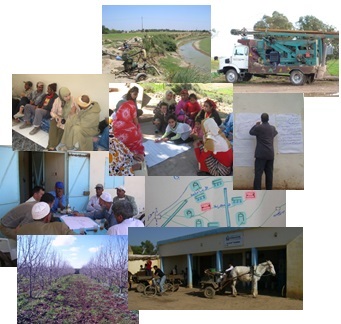Sylvaine Lemeilleur, Juliette Sermage, Annie Mellouki
DOI: https://doi.org/10.60569/7-a1
Numéro 7 – décembre 2019
Résumé
Au Maroc, un nombre croissant de producteurs s’engagent vers une meilleure prise en compte de l’environnement et des facteurs sociaux dans leur manière de produire. Par ailleurs, cette qualité socio-environnementale est aujourd’hui demandée par un nombre non négligeable de consommateurs urbains en quête de signes de qualité pour guider leurs achats. En l’absence du label public de l’agriculture biologique au Maroc jusqu’à l’automne 2018, certains acteurs ont choisi de se tourner vers une marque privée d’agroécologie et vers un système participatif de garantie (SPG). Dans cet article, nous présentons le processus participatif qui a permis à ce SPG d’émerger. Nous nous demandons dans quelle mesure le processus participatif utilisé a conduit à une vision commune et a induit une appropriation et une amélioration des règles. Les résultats du processus participatif et les indicateurs du protocole de suivi-évaluation montrent à la fois que les différentes composantes du SPG sont maintenant disponibles pour la communauté d’utilisateurs et que – malgré les tensions inhérentes à l’action collective—ces composantes semblent faire sens pour les participants. Néanmoins, il semble trop tôt pour évaluer les facteurs de pérennité de cette organisation dans le temps, et de nombreux défis restent encore à soulever pour le développement du SPG au Maroc.
Mots clés : Système Participatif de Garantie, Agroécologie, Approches participatives, Maroc
نظام ضمان قائم على المشاركة لعلامة زراعية إيكولوجية في المغرب
ملخص
في المغرب، يلتزم عدد كبير من المنتجين بمراعاة العوامل الاجتماعية والبيئية في أساليب إنتاجهم بشكل أفضل. علاوة على ذلك، فإن هذه الجودة الاجتماعية -البيئية مطلوبة اليوم من قبل عدد كبير من المستهلكين في المناطق الحضرية الذين يبحثون عن علامات الجودة لتغيير مشترياتهم. وفي غياب التصنيف العام للزراعة العضوية في المغرب حتى خريف عام 2018، اختارت بعض الجهات الفاعلة التحول إلى علامة تجارية خاصة في مجال البيئة الزراعية وإلى نظام ضمان قائم على المشاركة. في هذه المقالة، نفسر العملية التشاركية التي مكنت ظهور نظام الضمان التشاركي ونتساءل كيف أدت العملية التشاركية المستخدمة إلى رؤية مشتركة وأدت إلى ملكية وتحسين القواعد. وتبين نتائج العملية القائمة على المشاركة ومؤشرات تقييم بروتوكول الرصد أن العناصر المختلفة لنظام الضمان التشاركي متاحة الان لجميع المستعملين وأنه على الرغم من التوترات الكامنة في العمل الجماعي فانه يبدو أن هذه العناصر ذات معنى بالنسبة للمشاركين. ومع ذلك، يبدو من السابق لأوانه تقييم عوامل الاستدامة في هذه المنظمة مع مرور الوقت، ولا يزال هناك الكثير من التحديات التي يتعين طرحها لتطوير نظام الضمان التشاركي في المغرب.
الكلمات المفتاحية: نظام الضمان التشاركي، الزراعة الإيكولوجية، النهج التشاركي، المغرب
Participatory Guarantee System for an Agroecology Label in Morocco
Abstract
In Morocco, a growing number of producers are adopting practices that better consider environmental and social factors in their production methods. Moreover, this socio-environmental quality is increasingly demanded by urban consumers seeking quality indicators to guide their purchases. In the absence of a public organic agriculture label in Morocco until autumn 2018, some actors turned to a private agroecology label and a participatory guarantee system (PGS).
This article presents the participatory process that enabled the emergence of this PGS. We examine to what extent the participatory process led to a shared vision and fostered appropriation and improvement of the rules. The results of the participatory process and the indicators from the monitoring and evaluation protocol show that the different components of the PGS are now available to the user community and that—despite the inherent tensions of collective action—these components appear meaningful to participants. Nevertheless, it seems too early to assess the factors ensuring the long-term sustainability of this organization, and many challenges remain to be addressed for the further development of the PGS in Morocco.
Keywords: Participatory Guarantee System, Agroecology, Participatory Approaches, Morocco

